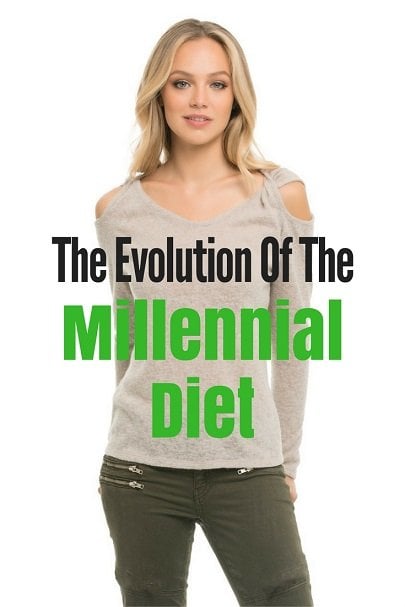
What Exactly is the Millennial Diet?
So what exactly is the millennial diet? Does it differ from past generations? As you would have guessed, like everything we millennials do, our diet is no exception to the rule. Check out how the millennial diet is shaping nutrition!
The millennial diet revisited
When we think of rapid evolution in our modern lives, we tend to think of the latest iPhone or those absurdly thin TVs.
Though it’s not often we imagine our food evolving, diets have seen more change in the last 30 years than the entire century before that.
To see where the millennial diet is headed, let’s first take a look at how we got here.
 Our Dieting History
Our Dieting History
The baby steps of food science began shortly after World War 2, with creations like margarine outselling classic alternatives in the marketplace. However, the real strides came during the 80s space race. As society looked to out design nature, it also experimented with completely new forms for food.
Never before had we seen so many food-stuffs that resembled nothing else in nature, or were just glorified versions of candy (Oreo Cereal, fruit snacks, etc.).
I’m not saying junk food solely led to the rise in obesity we see today, but it certainly didn’t help, and for that reason, millennials are right to be skeptical.
Diets Today
When you come to a fork in the road (or on your plate) and are unsure what to do, the easiest choice is to turn around and head back the way you came. This, in essence, is the thinking behind the paleo and low carb movements that 67% of millennials have said they’re interested in trying.
If it worked for our ancestors, the thinking goes, perhaps it could work for us too. Though the reasoning might be flawed (cavemen ate a lot more than meat and berries), the shift towards sustainable, organic, and locally grown foods has sparked an entirely new food culture.
Ask any restaurant and they’ll tell you “sustainability sells” and millennials spend more on average for food than their parents.
Then there are those that don’t want to give up the convenience of fast food and drive-thrus, but also recognize that plant-based whole foods are key to living a long healthy life.
The term coined for this group is “Fast-Casual” and it’s one of the fastest-growing diet mindsets among millennials today.
Restaurant chains like Chipotle and Panera may have popularized this style, but the success of the movement lies in the promise of fast and healthy, at a slightly higher cost. With federal labeling laws exposing the plump underbelly of fast-food classics, they’ve paved the way for health-conscious underdogs to have a fighting chance.
Recent Trends
 The real surprise in the last few years has been the emergence of nutritionally complete meal replacements.
The real surprise in the last few years has been the emergence of nutritionally complete meal replacements.
With so much confusion about healthy vs. unhealthy, some people have opted to go a different route altogether. Instead, consumers are asking for on-the-go powdered meal replacements that provide 100% of their Dietary Reference Intake (DRI).
Instead of counting calories, planning meals, or taking supplements, these fast-paced millennials grab their pre-portioned bottle, add water, and are out the door.
Meal replacements aren’t new, per se, but the difference this time around is the focus on plant-based whole food ingredients and eating nutritionally complete, not dieting. Instead of cornstarch and white flour, meal replacements use whole grains, nuts, oats, and seeds.
100%FOOD is one such producer, offering custom blends to suit diet restrictions and a variety of flavors to prevent taste fatigue. T
hough the trend is still in its infancy, it speaks volumes about the motivations of millennials and what pain points meal replacements solve as they enter the workforce.
Looking Forward
At this point, it’s difficult to say which of these will prevail through the 21st century. The local-sustainable movement has enough momentum that it’s hard to imagine it slowing in the next decade.
Millennials want to feel connected to their society, and diet is an important part of that. On the other hand, the rise of super-fast meals shows that a fast-paced lifestyle can quickly reprioritize how food dollars are spent.
What we do know is that the values are unlikely to change across their lifespan. Just as Baby Boomers have mostly held to the demand for an abundance of reasonably priced food, millennials will continue to demand locally sourced whole foods, even if the form they eat it in changes.
Wrap-Up
With the explosion of new products in the 80s and 90s, we entered the new millennium with the thinking that every food concept had been brought to life.
What we didn’t predict, was that children raised on purple ketchup and sprinkles covered yogurt would grow up to ask,
“Where are my ingredients sourced and what am I actually consuming?”
If you had told me a few years ago the evolution of food was slowing down I very well might’ve agreed but as this trend of “mindful eating” sets in, I think we’re just getting started.
- The Evolution Of The Millennial Food Diet: The New Norm - March 8, 2016



